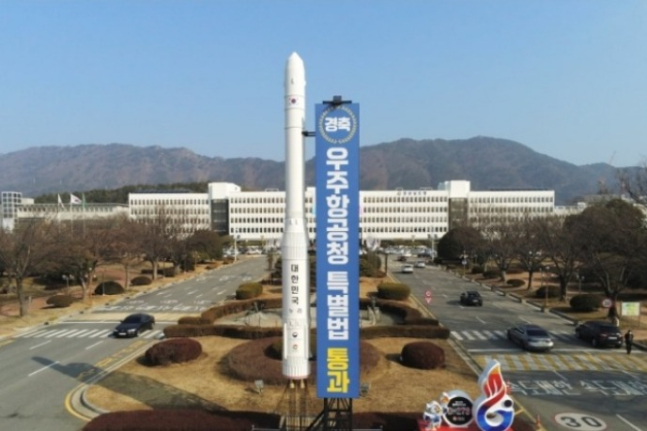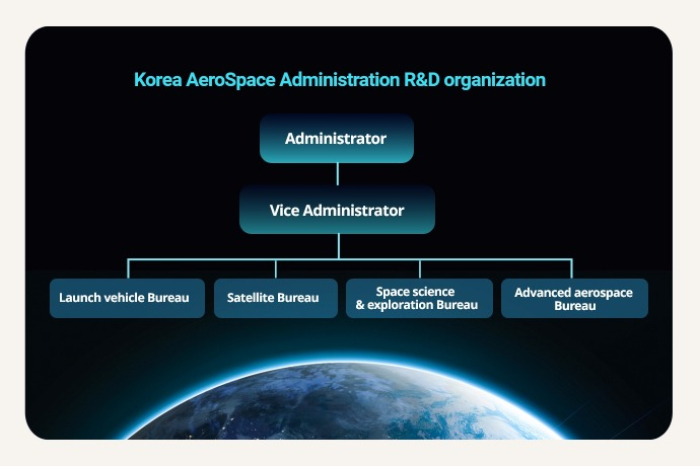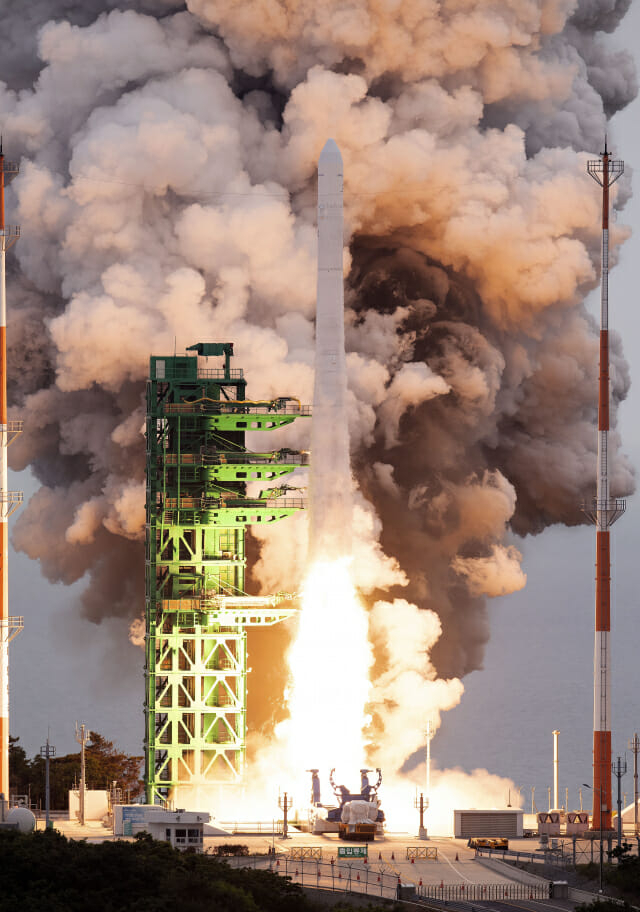Aerospace & Defense
KASA, Korea’s NASA, embarks on hunt for space talent
Asia’s No. 4 economy plans to launch the Korea AeroSpace Administration, like the US' NASA, in May
By Mar 15, 2024 (Gmt+09:00)
3
Min read
Most Read
LG Chem to sell water filter business to Glenwood PE for $692 million


KT&G eyes overseas M&A after rejecting activist fund's offer


Kyobo Life poised to buy Japan’s SBI Group-owned savings bank


StockX in merger talks with Naver’s online reseller Kream


Meritz backs half of ex-manager’s $210 mn hedge fund



South Korea seeking to join the global space power club is set to recruit about 120 local and foreign space experts for the country’s space agency, which will orchestrate national space programs like the National Aeronautics and Space Administration (NASA) of the US, from May.
According to Korea’s Ministry of Science and ICT on Thursday, the Korea AeroSpace Administration (KASA) plans to hire contract-based public officials from the private aerospace sector who can lead and conduct space programs as well as general public officials to be transferred or openly recruited from other government departments for policy setup and administration tasks.
It will receive recommendations or send out invitations to bring space experts at home and abroad to Korea’s first-ever fully dedicated space agency, under which the country’s existing state aerospace agencies will be placed.
KASA will embark on Korea’s space program projects with about 120 experts, fewer than its original plan to recruit 300, in May when it is slated for opening.
An administrator will head the new space agency, while a vice administrator will oversee four bureaus to research and develop launch vehicles, satellites, space science & exploration and advanced aerospace.

It pledges handsome payment for the space experts with the highest annual payment set at about 250 million won ($190,000), similar to the Korean president’s annual salary.
But considering that such salaries fall short of other countries’ standards, and the agency will be located in Sacheon, South Gyeongsang, about 300 kilometers south of Seoul, some people are skeptical of attracting global space talent to KASA.
FROM 1% TO 10%
KASA’s organization and recruitment plan was unveiled after Korea’s National Assembly in early January passed a set of bills related to KASA's establishment.
Korea has sought to join the global space power club for many years. Like his predecessors, Korean President Yoon Suk Yeol has pledged to foster the country’s space industry as a new growth engine.
In 2022, Yoon vowed to send the country’s spacecraft to the Moon in 2032 and Mars in 2045.
The launch of KASA is part of that plan.

On Wednesday, the country announced plans to set up a new space industry cluster in the next eight years to enable the country to manufacture satellites and rockets, and to train astronauts.
For the project, the county vows to allocate some 1.5 trillion won of the budget in 2027, nearly double that of this year’s budget.
Introducing the country’s space industry funding plan, President Yoon envisioned that Korea would capture 10% of the global aerospace market in 2045 from the current 1%.
The country also expects the space industry will create some 250,000 new jobs.
KASA will lead Korea’s national space programs, as well as aeronautics and space research, including moon and Mars exploration projects, like NASA.
Currently, the Korea Aerospace Research Institute (KARI) is responsible for the country’s aeronautics R&D as a space agency.
The institute will be placed under KASA, which will have more power and independence than KARI under the new laws.
In May 2023, Korea succeeded in sending research satellites into orbit from the country’s launch pad, using rockets manufactured with homegrown technology.
A Korean spy satellite went into orbit following a successful launch from the US in November.
Write to Kyung-Ju Kang at qurasoha@hankyung.com
Sookyung Seo edited this article.
More to Read
-
 Aerospace & DefenseKAI inks deal with SpaceX to launch mid-sized satellites in 2025
Aerospace & DefenseKAI inks deal with SpaceX to launch mid-sized satellites in 2025Dec 01, 2023 (Gmt+09:00)
1 Min read -
 Aerospace & DefenseS.Korea succeeds in 3rd launch of homegrown rocket Nuri
Aerospace & DefenseS.Korea succeeds in 3rd launch of homegrown rocket NuriMay 25, 2023 (Gmt+09:00)
3 Min read -
 Aerospace & DefenseS.Korea's lunar orbiter Danuri captures back side of the moon
Aerospace & DefenseS.Korea's lunar orbiter Danuri captures back side of the moonApr 12, 2023 (Gmt+09:00)
1 Min read -
 Aerospace & DefenseHanwha Aerospace to launch 4 more Nuri rockets under $220 mn project
Aerospace & DefenseHanwha Aerospace to launch 4 more Nuri rockets under $220 mn projectDec 02, 2022 (Gmt+09:00)
2 Min read -
 Aerospace & DefenseS.Korea’s first mission to the Moon, Danuri, enters transfer orbit
Aerospace & DefenseS.Korea’s first mission to the Moon, Danuri, enters transfer orbitAug 05, 2022 (Gmt+09:00)
2 Min read
Comment 0
LOG IN


